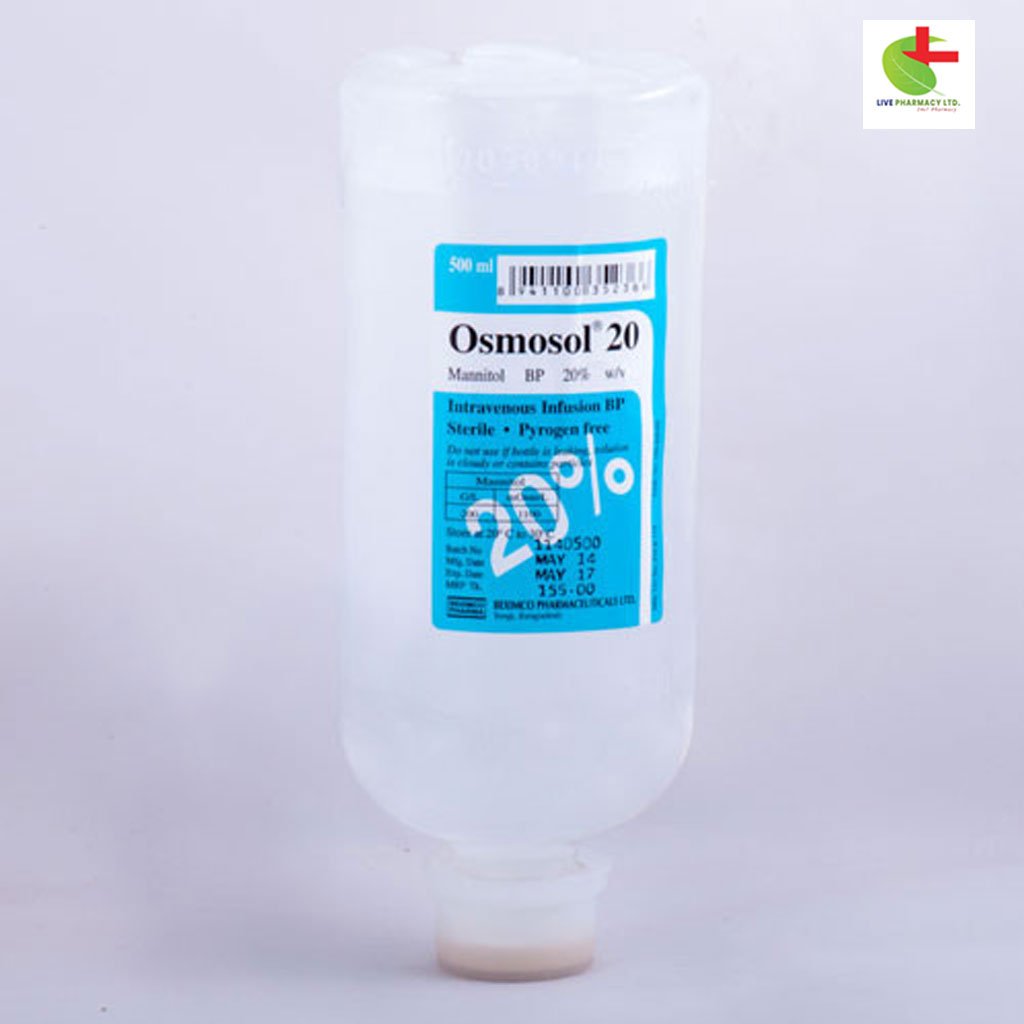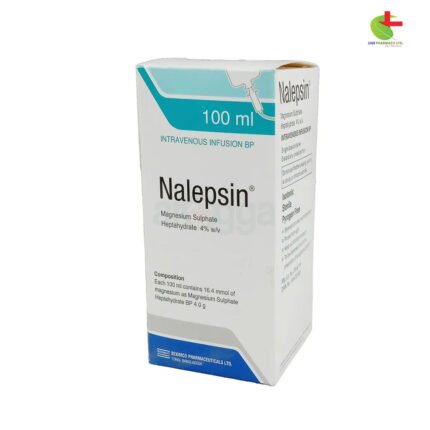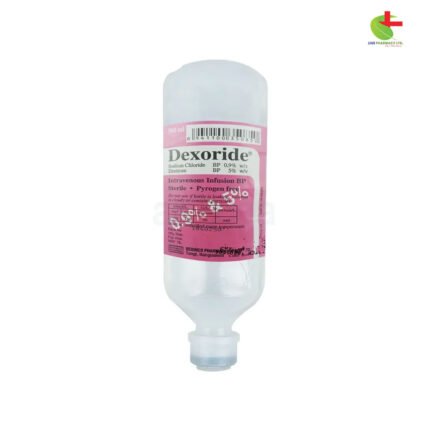Osmosol
155.00৳ Bottle (500ml)
- Osmosol is a clear, sterile solution used primarily as an osmotic diuretic to manage acute renal failure, elevated intracranial and intraocular pressure, and acute drug poisoning.
- It also serves as an irrigating solution to prevent hemolysis during prostatic resection and aids in the symptomatic relief of edema, reperfusion injury, pregnancy termination, and bowel preparation.
- Administered via IV infusion, Osmosol increases plasma osmotic pressure, drawing water out of tissues and promoting diuresis.
- Key uses include renal insufficiency, elevated intracranial pressure, and bowel preparation.
 Brand
Brand
|
Beximco Pharmaceuticals Ltd |
|---|---|
 Generics
Generics
|
Mannitol |
 Type
Type
|
IV Infusion |
Indications
Osmosol is an osmotic diuretic primarily administered through IV infusion to maintain renal function in acute renal failure and to alleviate elevated intracranial and intraocular pressure. It serves as an irrigating solution during transurethral prostatic resection to prevent hemolysis and hemoglobin accumulation. Osmosol is also effective in treating acute drug poisoning where kidney elimination is necessary. Additional uses include symptomatic relief of edema, management of reperfusion injury, termination of pregnancy, and bowel preparation. Key indications for Osmosol include:
- Renal insufficiency
- Reperfusion injury
- Elevated intracranial pressure
- Bladder irrigation
- Elevated intraocular pressure
- Bowel preparation
- Edema
- Prophylaxis in renal failure
- Poisoning management
- Pregnancy termination
Description
Osmosol is a clear, nearly colorless sterile solution, with each 100 ml containing 20 g of Osmosol BP. Administered parenterally, Osmosol increases plasma osmotic pressure, drawing water out of body tissues and inducing osmotic diuresis. This solution is primarily used via IV infusion to support renal function in acute renal failure and to reduce elevated intracranial and intraocular pressures. Additionally, it is used as an irrigating solution to prevent hemolysis during transurethral prostatic resection, manage acute drug poisoning, and provide symptomatic relief for edema, reperfusion injury, pregnancy termination, and bowel preparation.
Dosage & Administration
- Renal Insufficiency:
- Adults: 50 to 100 g IV, adjusted to maintain urine flow of at least 30 to 50 ml/hr.
- Children: 2 g/kg or 60 g/m² of body surface area, administered over 2 to 6 hours.
- Cerebral Edema, Elevated Intracranial Pressure, Elevated Intraocular Pressure, Glaucoma:
- Adults: 1.5 to 2 g/kg IV, administered over 30 to 60 minutes.
- Children: 1 to 2 g/kg or 30 to 60 g/m² of body surface area, administered over 30 to 60 minutes.
- Adjunctive Therapy for Toxic Substance Removal:
- Adults: 50 to 200 g IV, adjusted to maintain urine flow of 100 to 500 ml/hr.
- Children: 2 g/kg or 60 g/m² of body surface area.
- Pregnancy Termination: 50 g of Mannitol (250 ml) instilled into the amniotic cavity induces abortion in a high percentage of pregnancies.
Contraindications
Osmosol infusion is contraindicated in patients with pulmonary edema, congestive heart failure, inadequate urine flow, dehydration, acidosis, intracranial bleeding, and renal failure unless a test dose has shown a diuretic response.
Side Effects
Common side effects of Osmosol IV infusion include fluid and electrolyte imbalances, circulatory overload, and acidosis, particularly at high doses. Other possible side effects are nausea, vomiting, thirst, headache, dizziness, fever, tachycardia, chest pain, hyponatremia, dehydration, blurred vision, urticaria, and hypertension or hypotension.
Pregnancy & Lactation
The safety of Osmosol during pregnancy has not been established. There is no available information on the excretion of mannitol in breast milk; use should be based on a careful consideration of the risk-benefit ratio.
Precautions & Warnings
Monitor the infusion rate closely to avoid fluid and electrolyte imbalances and circulatory overload. Discontinue the infusion if signs of renal dysfunction, heart failure, or pulmonary congestion occur. Osmosol should not be administered with whole blood, and the infusion should be stopped immediately if any adverse reactions occur. Do not use if the solution is cloudy, contains particles, or is past the expiration date.
Therapeutic Class
Osmotic diuretics
Storage Conditions
Store Osmosol at 20° to 30°C. Exposure to lower temperatures may cause crystal formation, which should be dissolved by warming the bottle in hot water for about 30 minutes. Cool to body temperature before use. Discard any solution that cannot be fully dissolved or if the container is opened.













Reviews
There are no reviews yet.